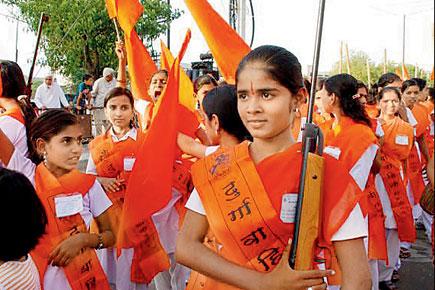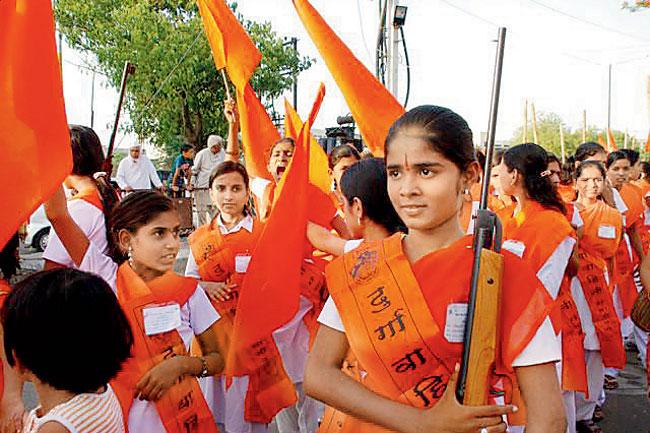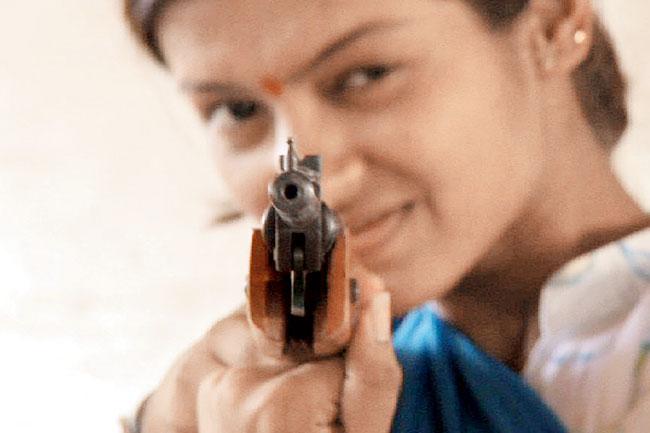India-born, Canada-based Nisha Pahuja will screen her documentary, The World Before Her, in select cinemas in India. The documentary will juxtapose the world in a Durga Vahini camp with the Miss India pageant

Durga Vahini camp
The cliche Bollywood dialogue goes that a woman is so much more — a daughter, a mother, a wife and so on. But in the case of Nisha Pahuja’s documentary, The World Before Her (TWBH), it would be wrong to watch it as a feminist film; it’s much more. From women who find the secret thrill in using rifle guns, to young Miss India 2011 contenders who find the redundancy in the wearing ‘skimpy clothes’ for the biking round — it captures the contemporary Indian woman who is neither idolised nor demonised but caught in her shades of grey.
ADVERTISEMENT

14-year-old-Chinmayee at the Durga Camp Graduation Ceremony
The entire scape
After all, connecting the disparate worlds of a Durga Vahini camp and a Miss India beauty pageant are women who are probing ways to take to the podium irrespective of the focus on making bombs or being declared beautiful. Pahuja, an award-winning filmmaker, enjoyed the status of being the first who ventured into the zone of a Durga Vahini camp; Hindu militaristic camps that are supported by institutions such as the Vishwa Hindu Parishad. Pahuja has been inspired by Mumbai, and was inspired to film Suketu Mehta’s popular title, Maximum City. She had canvassed a film called Bollywood Bound, and somewhere, lost her love for the city.

Pooja Chopra posing for a photo shoot
TWBH had its origins in Mumbai, “I had come to the city for an event that was celebrating Yukta Mookhey’s crowning. When I saw what a big deal the pageant is in India, I wanted to explore it,” explains Pahuja.
Distance matters
Her distance and insight into the city are reflective of her compassion for her characters in TWBH. “Whenever I have been in Bombay, it feels like it’s India,” she shares, and has been coming to India for 16 years, adding, “I have been in love with Bombay as in my head I had given it a ’70s Bollywood soundtrack but the city had changed, somewhat. There is a kind of materialism now, which I don’t feel in sync with — that is somewhere passed off as modernity.”

Renuka learns to use rifle at a Durga Vahini Camp
Sense and sensibility
Hinged on the modern, a gamut of people be it Ruhi, the girl from Jaipur; Akanksha who was sent to a monastery in Ladakh for eight years as a child (and who eventually gets crowned) and Prachi Trivedi, who Pahuja’s regards as “the film’s strongest character” illustrate the sham of materialism paraded as a cosmopolitanism that the girls try to find themselves through.

Camp leader, Prachi, addresses a group of girls. She remained Pahuja’s favourite character in the film
While they oscillate between marriage and making bombs, it’s the people around that give insight into how the gender is perceived. The Toronto-based 46-year-old shares, “I had the most sympathy for Prachi,” as she is stuck between the Durga camp’s ideals and an independent identity. Ironically, it was the camp where the shoot was smoother except the first day, when the camp decided to let the cameras in; they refused after being chased for two years.
She says, “I had told them that now that I have started, you’d have to drag me out as I am not stopping before this is completed.” With Anurag Kashyap presenting the film and a kickstarter campaign to encourage its screening across India, she has her hands full.
The six-month kickstarter campaign launches on March 8. LOG ON TO www.kickstarter.com
 Subscribe today by clicking the link and stay updated with the latest news!" Click here!
Subscribe today by clicking the link and stay updated with the latest news!" Click here!







